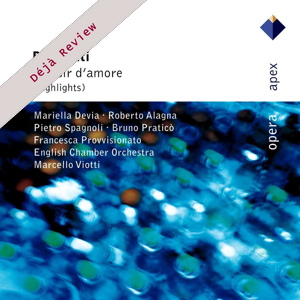
Déjà Review: this review was first published in July 2004 and the recording is still available.
Gaetano Donizetti (1797-1848)
L’elisir d’amore (excerpts)
Adina – Mariella Devia (soprano)
Nemorino – Roberto Alagna (tenor)
Belcore – Pietro Sapgnoli (bartone)
Dulcamara – Bruno Pratico (bass-baritone)
Giannetta – Francesca Provvisionato (mezzo-soprano)
Tallis Chamber Choir
English Chamber Orchestra/Marcello Viotti
rec. 1992, All Saints Church, Petersham, UK
Apex 2564 61496-2 [72]
Alan Blyth’s original review in The Gramophone of the complete version of this recording, first issued in 1993, makes fascinating reading. Not only does he describe the recording as ‘a delight from start to finish’ (a view with which I concur), but later on in the review he goes on to talk about the singer playing Nemorino, before commenting on the singing he first has to explain something of the singer’s background as he might not be known to the readers in 1993. How life has changed; nowadays Roberto Alagna is well known. One of the delights of this recording, though, is how it has captured his fresh and appealing Nemorino, before he started singing more substantial roles and thus rather darkening his voice. His performance is youthful and ardent and suitably Italianate. His performance of ‘Una furtiva lagrima’ is quite stunning; it is sung pensively and subtly, not as a barn storming crowd pleaser.
As the heroine, Adina, Mariella Devia is stylish and charming. She is perfectly at home in the role’s fioriture, using it to both characterise Adina and to delight the ear. But she sounds a little less girlish than some singers, rather more mature. Combined with Alagna’s naïve Nemorino, this gives an interesting dynamic to the opera with a slightly older, more mature Adina seeming understandably a formidable to Nemorino. This is one of the opera’s delights; Donizetti never guys his characters and though they amuse us, they can come across as real people with real concerns.
As Dulcamara, the quack who is the main focus of the comedy element in the opera, Bruno Pratico is vivid and lively, with a wonderful feel for the text which is beautifully immediate whether or not you speak Italian. The drawback is that he does not have as rich a voice as I would like. Pietro Spagnoli is a rather correct Belcore; he fits fine into the ensembles but rather lacks something of the comic swagger that the role requires.
The singers are ably supported by Marcello Viotti and the English Chamber Orchestra, who produce a lively, sparkling account of the score whilst remaining sympathetic to the singers’ needs. The choir is the Tallis Chamber Choir and it is rather curious that such an idiomatically Italian cast and conductor should produce a recording using English choir and orchestra. Still, it is of no matter when the choir and orchestra are as responsive as they are here and attuned to the work’s style. Evidently the recording used a new edition of the score by Alberto Zedda; something which is to be welcomed even if the innocent ear fails to detect any startling differences.
If you feel that you have too many versions of this opera on your shelves then I can recommend these potted highlights. They would also serve as an ideal introduction to this delightful opera. And if Donizetti’s charming comedy does not really appeal to you, then buy it anyway to hear what the young Alagna could do.
Robert Hugill
Help us financially by purchasing from



















